Due to technical difficulties in recording (seriously don’t install the Windows 10 Creator’s Update), Elizabeth and Kori are taking to pen and pixel this week to discuss another long overdue topic: queer cinema.
Over the course of the last six months, Kori and Elizabeth have realized that they come from drastically different backgrounds, and with that comes some pretty big culture differences in how they define their own queer experiences. Elizabeth was raised in the Bay area, with LGBT culture within easy reach. Kori, on the other hand, grew up so deep in the Bible belt, you’d have to wade through a river a cow shit and at least seven churches just to see a rainbow. No two queer women have the same life experience and media tastes, and favorite films are an excellent way to discuss those differences.
Kori: The Midwest Small Town Girl
I grew up in a small farm town. I’ve helped with harvests and hauled bailed hay up to barns to make extra money. What we lacked for in stores or places to eat, or any form of entertainment, we made up for with the sheer volume of churches around town. I was so insulated I thought thespian and lesbian were the same thing until high school. Yeah. So I grew up in a very religious, very unfriendly culture for anything LGBT. I don’t like watching sad films. I don’t even like watching art house films. Maybe that’s the small town woman in me, but I still see it as some hippy-dippy shit that is so far removed from my experiences that you might as well put a Bollywood film in front of me with no subtitles. Only, I’d enjoy the Bollywood film. So my selections are going to reflect that. Unlike the culture I grew up in, I gravitated toward rom-coms (what precious few there are), or slice of life films that spoke to me.
Saving Face (2004)
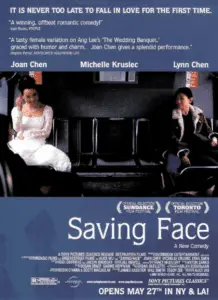 Look, this movie probably low-key saved my life. I had only seen one or two other positive wlw films prior to this movie, and those were hard to come by. I was in college, closeted, and my girlfriend was even more in the closet than I was. We’d watched some “wlw” movies together. Lost and Delirious and High Tension. One of which is possibly the most depressing young wlw story in existence, the other is a nightmare of titanic proportions rife with biphobia and evil queer women tropes. I was still stuck living in the middle of nowhere, George W. Bush was president, and there really wasn’t anything to look forward to. Media with positive queer representation seemed to drop like flies, and we were left with tragic ending after tragic ending.
Look, this movie probably low-key saved my life. I had only seen one or two other positive wlw films prior to this movie, and those were hard to come by. I was in college, closeted, and my girlfriend was even more in the closet than I was. We’d watched some “wlw” movies together. Lost and Delirious and High Tension. One of which is possibly the most depressing young wlw story in existence, the other is a nightmare of titanic proportions rife with biphobia and evil queer women tropes. I was still stuck living in the middle of nowhere, George W. Bush was president, and there really wasn’t anything to look forward to. Media with positive queer representation seemed to drop like flies, and we were left with tragic ending after tragic ending.
I was pretty down about myself and my future at this point. The only stories that matched this part of me offered little hope unless I suddenly found a cache of gold buried underground and became wealthy enough to move to a coastal city.
Then Saving Face came out. Yes, it’s set in Queens. Yes, I’m quite aware I’m not Asian.
This movie still had more relatability and heart and hope in it than anything I’d seen before. Wil (Michelle Krusiec) and Vivian (Lynn Chen) were two adult women with adult jobs and adult responsibilities. They had familial pressures, and job pressures, and they still found each other. It was sweet and gentle, and achingly genuine. And, as if that weren’t enough… they got their happy ending.
Lord almighty, they got a happy ending. I remember reading straight reviewers who complained that the ending was too wrapped up. So fucking what! It wasn’t for you. It was for the queer women and girls who just wanted something nice to hold onto and to remember and think “that could be my someday”. And it worked.
Imagine Me & You (2005)
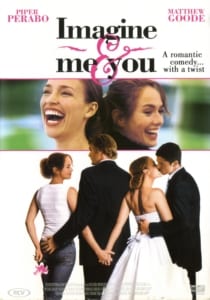 And look at my divine luck! The next wlw movie I watched after getting my hands on Saving Face was another romantic comedy! Look. Life is hard. I don’t need to watch material that reminds me of how much it sucks, or makes it even harder. I like my escapism, and I like being able to get out of where I am at any given moment and cast whatever is going on in my life aside and be swept away in the joy of the characters on screen.
And look at my divine luck! The next wlw movie I watched after getting my hands on Saving Face was another romantic comedy! Look. Life is hard. I don’t need to watch material that reminds me of how much it sucks, or makes it even harder. I like my escapism, and I like being able to get out of where I am at any given moment and cast whatever is going on in my life aside and be swept away in the joy of the characters on screen.
Imagine Me & You was another movie I needed at the time. It showed me that movies like Saving Face weren’t rare one-offs. There was still joy out there to be found. Watching Rachel (Piper Perabo) and Luce (Lena Headey) find their way to each other, getting to have each other without ruining their lives and families? Messages like that are important. They still are.
Show Me Love aka Fucking Amal (1999)
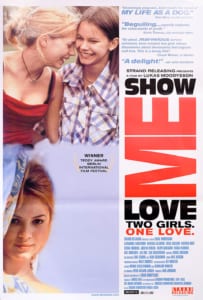 Baby’s first wlw film. I found this my senior year of high school. Don’t ask me how, I can’t even remember how I stumbled onto it. But it was my first wlw film, and at the time it resonated with me painfully. Part of it was because they were my age. Part of it was because they had the same small town ennui that I did. They lamented their life in Amal and wondered if there could be more out there. They struggled with their feelings for each other. They were both little shits. They could have easily been me.
Baby’s first wlw film. I found this my senior year of high school. Don’t ask me how, I can’t even remember how I stumbled onto it. But it was my first wlw film, and at the time it resonated with me painfully. Part of it was because they were my age. Part of it was because they had the same small town ennui that I did. They lamented their life in Amal and wondered if there could be more out there. They struggled with their feelings for each other. They were both little shits. They could have easily been me.
They were real.
This movie is also the reason I have a weird love for Foreigner’s “I Want to Know What Love Is”. I guess there are worse songs to serve as the soundtrack for the first wlw kiss you’ve ever seen.
Elizabeth: The SF Bay Area Hipster
I was born and raised in northern California in the Bay Area, just a stone’s throw away from San Fransisco. I didn’t grow up religious at all. In fact, the most religious thing we ever did in my childhood was bake a birthday cake for Jesus on Christmas, though I suspect that had a lot more to do with having cake on Christmas than any real religious leanings. Despite having grown up in what most people would consider the “Gay Friendly” capital of the United States, “Gay Friendly” has always been a relative term. We insulated our communities from outsiders to keep ourselves safe. We presented a very specific face to the outside world despite being much less monolithic behind closed doors. This monolithic culture is shaped by, and the inspiration for, many of the tropes in queer cinema. It wasn’t until I started meeting queer women from places other than California that it occurred to me that The L Word and San Fransisco’s brand of Pride weren’t universal queer experiences.
Because of where I grew up, my taste in queer cinema is pretty stereotypical. Liking romantic tragedies and satire, however, is probably more of a personality quirk. Ask anyone who knows me. I’m oh-so-Extra and I live for The Drama. Keep your rom coms, I want my dramatic Shakespearean monologues.
But I’m a Cheerleader (1999)
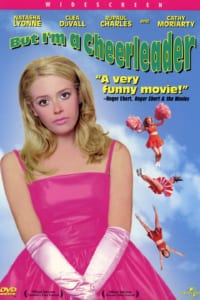 Okay so I know I just said I like angst, but this is the exception to the rule, and it will always be my favorite queer film. It was one of the first queer films I watched that wasn’t a miserable slugfest about AIDS or something equally difficult to enjoy. It’s a satire on conversion therapy, painting it in the ridiculous light it deserves to be presented in. There is something viscerally satisfying about the way this film deconstructs gender roles and makes fun of heteronormativity. It’s bitingly funny, and in a way that is very specifically queer. The movie’s R rating is a hilarious sign of the time it was released in. It’s a mild PG-13 at worst by modern standards. At a time when conversion therapy was still considered a reasonable thing to do to a queer person, this film was the reassurance I needed that I wasn’t crazy for not wanting to be straight.
Okay so I know I just said I like angst, but this is the exception to the rule, and it will always be my favorite queer film. It was one of the first queer films I watched that wasn’t a miserable slugfest about AIDS or something equally difficult to enjoy. It’s a satire on conversion therapy, painting it in the ridiculous light it deserves to be presented in. There is something viscerally satisfying about the way this film deconstructs gender roles and makes fun of heteronormativity. It’s bitingly funny, and in a way that is very specifically queer. The movie’s R rating is a hilarious sign of the time it was released in. It’s a mild PG-13 at worst by modern standards. At a time when conversion therapy was still considered a reasonable thing to do to a queer person, this film was the reassurance I needed that I wasn’t crazy for not wanting to be straight.
The film has a more diverse cast than one would expect. Each queer character is an archtype, but not stereotypically so. Well, no more than a typical ensemble comedy requires. It’s humanizing, heartfelt, and very earnest. It will make you laugh at things that are often hard to laugh at in real life, and that is something the queer community desperately needs more of.
Queer lady favorites Natasha Lyonne and Clea Duvall star, with RuPaul in a fantastic supporting role. Also Dante Basco is in it. He played Rufio in Hook. If you’ve never seen it, treat yourself. It is a genuinely funny and heartwarming movie.
Lost and Delirious (2001)
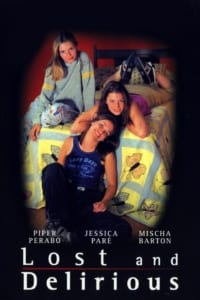 I have a soft spot for the depressing, meditative, arthouse films about the queer experience. I am a big romantic at heart, in the classical literature sort of way, which means I actually enjoy The Angst more often than not. This type of film played a big part in shaping my queer identity. If I had to put my finger on the root of my flair for the dramatic, it is definitely Paulie’s character in this film. Lesbians going crazy in films is as old as the art itself. It’s part of the Bury Your Gays trope, after all. But there is something to be said for how openly, boldly, and bravely Paulie loves Torie, and how much she spirals when they can’t be together anymore. I’ve had many great romances in my life that are similar to this, especially when I was a teenager. It’s not a great feeling to watch yourself die at the end of a film, but at the time, I was just thrilled to see myself in a film at all.
I have a soft spot for the depressing, meditative, arthouse films about the queer experience. I am a big romantic at heart, in the classical literature sort of way, which means I actually enjoy The Angst more often than not. This type of film played a big part in shaping my queer identity. If I had to put my finger on the root of my flair for the dramatic, it is definitely Paulie’s character in this film. Lesbians going crazy in films is as old as the art itself. It’s part of the Bury Your Gays trope, after all. But there is something to be said for how openly, boldly, and bravely Paulie loves Torie, and how much she spirals when they can’t be together anymore. I’ve had many great romances in my life that are similar to this, especially when I was a teenager. It’s not a great feeling to watch yourself die at the end of a film, but at the time, I was just thrilled to see myself in a film at all.
A young Piper Perabo stars as Paulie, the same actress who plays the protagonist in Imagine Me & You. It also has a very young Mischa Barton in it, of The OC fame. Despite being a textbook example of the Bury Your Gays trope, this is still an excellent film. Watch with caution, however. This movie needs about half a dozen trigger warnings, and the ending is depressing as hell.
Carol (2015)
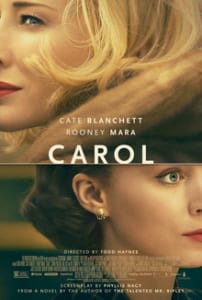 Hey, I warned you. I like angst.
Hey, I warned you. I like angst.
The number of straight male reviewers who couldn’t seem to relate to the protagonists of this film is a glowing review on its own. One of my favorite things about this film is how it handles the intrusiveness of men upon the lives of queer women, both visually and narratively. Strong chemistry is something that is tragically lacking from many wlw couples in films, but Carol is not one of those films.
Cate Blanchett and Rooney Mara are devastatingly well cast. The film is angsty in the way much of queer cinema likes to be, but the uncharacteristically happy ending elevates it above the crowd. The film was snubbed at the Oscars for a Best Picture nomination, which wasn’t entirely surprising, but still infuriating. It deserved at least the nomination, if not the win. It’s just that good.
Celebrating Both Diversity and Shared Experiences
As we both have touched on, queer cinema is still struggling to reflect diversity amongst queer women while also reflecting our shared experiences. The desire to find shared experiences is very strong, especially since it’s only been very recently that this shared queer cultural experience has been accessible to a wider variety of individuals in the queer community. However, now that it’s so much easier to find each other, it’s becoming more and more obvious that we are much more diverse a group than our media, or even ourselves, previously realized.
While we would also like to see more queer characters in films that are not just about being queer, we don’t want to see films about our life experiences disappear entirely. We want more of both. We need more of both. Of the various mediums we have at our disposal to tell stories, films are some of the most accessible, versatile, and universally loved. If we want to bring a wider variety of queer stories to life, this is the perfect medium for it.
What’s your favorite queer film? Or if you prefer, what’s a queer film you absolutely can’t stand? What would you like to see more of in queer cinema, or less? Let us know in the comments! And don’t worry, we’ll be back with a new podcast next week. The topic: our new favorite Netflix series, Sense8. See you then!
[starbox id=”Kori,Elizabeth”]


